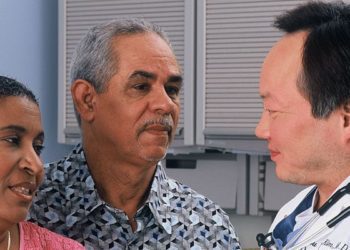Shared decision making, options, and trust improve experience for adolescents with cancer
1. More than half of adolescents with cancer desired to make decisions together with their oncologist after considering the opinion of their parent or guardian. They also reported increased regret when feeling uncertain about their best option, uninformed, unclear about their own values, or unsupported in their decision-making.
2. Regret regarding initial treatment course was lowest among patients who reported feeling complete trust in their oncologist.
Evidence Rating Level: 2 (Good)
Study Rundown: Unlike young children, adolescents with cancer experience illness in the midst of developing independent identities, interests, opinions, and beliefs, making them more likely to desire having input in decisions regarding their cancer treatment plan. In this study, researchers sought to investigate adolescents’ experience with their involvement in the decision-making process around the time of their diagnosis. They also sought to evaluate adolescents’ sense of regret when recalling their treatment decisions months later. In surveying patients within 1 to 6 weeks of diagnosis as well as 4 and 12 months later, researchers found that most adolescents preferred to make decisions about their cancer treatment plan together with their oncologist and after considering the opinion of a parent or guardian. Patients noted increased regret when they felt their oncologist told them what the treatment would be without offering options, when they felt their oncologist did not understand what was most important to them at the outset of their treatment, or when they felt they did not completely trust their oncologist. This study offers critical insight into the unique needs of adolescent patients as they navigate a cancer diagnosis, highlighting the importance of treating adolescents as independent thinkers in addition to building a trusting relationship with them.
Click here to read the article, published today in Pediatrics
Relevant Reading: Adolescents’ preferences for treatment decisional involvement during their cancer
In-Depth [survey]: In this study, researchers surveyed patients ages 15 to 29 years diagnosed with cancer and seeking treatment at Dana-Farber Cancer Institute in Boston. Initial surveys were sent out from April 2014 to October 2017 to English-speaking patients within 1 to 6 weeks of diagnosis. Follow-up surveys were sent at 4 and 12 months after initial diagnosis. Of 303 eligible patients, 203 completed the baseline survey, 177 completed the 4 month follow up survey, and 154 (51% of eligible, 76% of initial surveyed) completed all assessments. Researchers surveyed patients’ impressions of the quality of communication, their oncologists’ understanding of their desires at the outset of treatment, and their trust in their oncologist. These markers were then compared to patients’ regret, with heightened regret considered as a score of >25 on the previously validated Decisional Regret Scale. 58% of patient preferred to make decisions together with their oncologist; 51% preferred to make a decision after considering a parent or guardian’s opinion. 34% of patients who reported their oncologist told them the treatment plan without offering options noted heightened regret, as opposed to 17% who were offered other choices (p=.01). 66% of patients who stated their oncologist did not understand what was most important to them at the outset of treatment experienced heightened regret, as opposed to 16% of those who felt their oncologist understood their values (p=<.0001). Only 15% of patients who completely trusted their oncologist had heightened regret, as opposed to 59% of those who did not (p=<.0001).
Image: PD
©2019 2 Minute Medicine, Inc. All rights reserved. No works may be reproduced without expressed written consent from 2 Minute Medicine, Inc. Inquire about licensing here. No article should be construed as medical advice and is not intended as such by the authors or by 2 Minute Medicine, Inc.



![2MM: AI Roundup- AI Cancer Test, Smarter Hospitals, Faster Drug Discovery, and Mental Health Tech [May 2nd, 2025]](https://www.2minutemedicine.com/wp-content/uploads/2025/05/Untitled-design-350x250.png)



